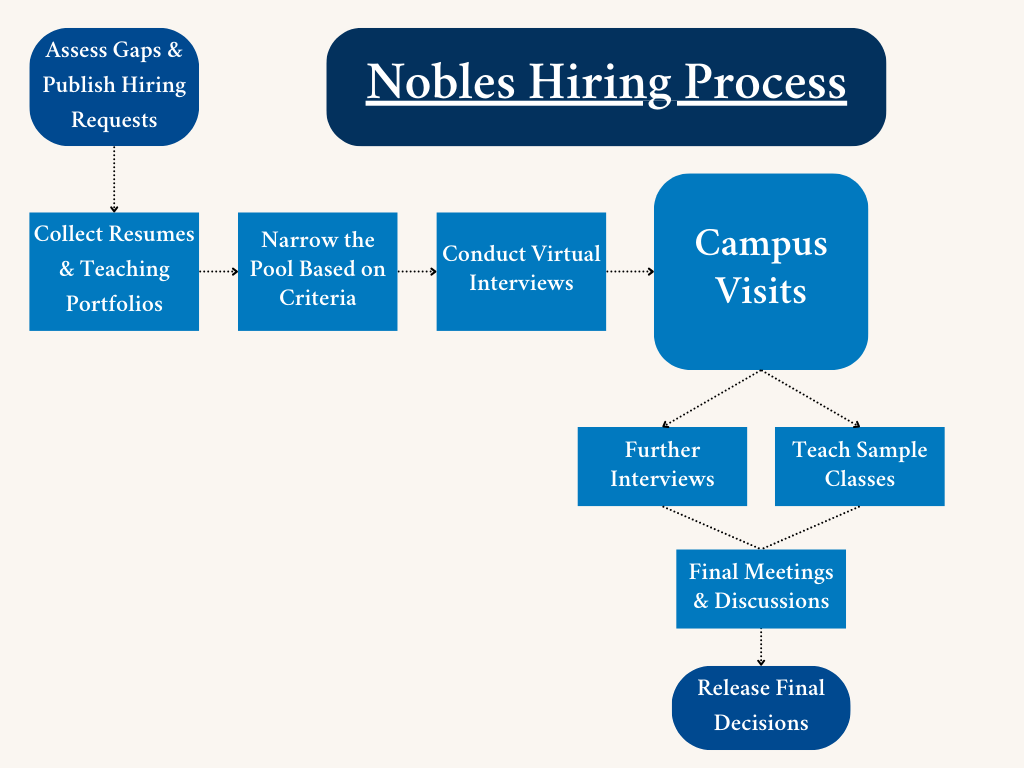
Nobles’ multi-step hiring process spans months and selects educators with a particular set of qualities. Numerous teachers, administrators, and students are involved with every hire. However, Nobles is still striving for more uniformity in its recruitment process.
The cycle begins with analyzing what positions need to be filled the following year. “At some point in late fall is usually when we start to know what openings we’re going to have,” Dean of Faculty Maura Sullivan said. Once the gaps are discovered, Nobles posts the information for needed faculty on numerous websites. They try to open as many channels for potential hires to apply for positions as possible. “[Positions] are always posted on the National Association of Independent Schools job site, along with a number of other places. We work with some teacher placement agencies too. They send us candidates, and we have people directly applying through our website. So we get candidates through all these different means,” Head of the Upper School Alison Easterling said. After reviewing resumes and cover letters, administrators meet to decide who to select for the next stage of the process.
After an initial round of cuts is made, approximately six to ten applicants are selected for Zoom interviews with the Nobles faculty. On these calls, consistency is key. “A lot of attention has been paid over the last few years to create a more uniform process,” History and Social Science Department Chair Louis Barassi said. He discussed a group of questions that could be kept consistent and applied to every applicant. “We prefer this to just being spontaneous and having a good conversation,” he said. This uniformity during Zoom interviews is valued across departments. “When I think about hiring, I think about variables. I try to keep as many variables as steady as possible,” English Department Chair Jessica Brennan said. After the interviews are complete, department chairs engage in ongoing conversations with Easterling and Head of School Cathy Hall. “There’s definitely a fluidity to this part of the process,” Brennan said.
“A lot of attention has been paid over the last few years to create a more uniform process.”
Despite the absence of a strict formula, the administrators narrow the field from ten candidates to a pool of around three. The remaining applicants are then invited on campus to teach a sample class and meet with Nobles’ faculty. The department chairs speak to the importance of the sample class in the hiring process. “It can give you a taste of their style. If something goes wrong, it is a great opportunity to see how a candidate responds to it. In a language class, if a student doesn’t understand an instruction, it presents a unique challenge for the instructor,” Modern Language Department Chair Laura Yamartino said. These classes are also a unique point in the process as they allow for student input.
The method varies from year to year, changing from surveys with assigned numerical scores to informal class discussions. However, students feel as though it is an essential part of hiring. “Ms. Brennan made the class feel like a valued part of the process, even though we are, of course, not the most important voice in the decision,” Willy Connors (Class I) said. This winter, his class has been visited by several potential English teachers. He enjoyed the experience of having a say in an administrative decision and said it fostered numerous exciting debates in the classroom. His main takeaway, however, was one of gratitude: “Getting to see the different candidates made me appreciate just how experienced and personable our teachers are. We’re very fortunate,” Connors said.
These qualities are present in every member of our faculty for a reason. After all of the prospective teachers complete their campus visits, administrators meet to decide the final recipient of the position. At this point in the process, they are looking for faculty with specific qualities beyond academic prestige. “We think a lot about how teachers interact with students. We want people who also enjoy collaborating and being good colleagues, and who are going to find other ways to contribute, and I think in the end, to work hard,” Barassi said. At an institution such as Nobles, applicants need to be more than teachers. To be considered for a position, they usually have to fill multiple niches on campus. But above all, they need to prioritize the learners on campus. “The candidate has to place students first,” Brennan said.After multiple meetings, the final decision is released. However, there is still room for improvement in the process. One area of potential growth is expanding the kind of person that the school hires. “Nobles, as a community, wants to continue to think about hiring a broad range of teachers. We want to continue to have kids feel as though they have teachers who are like them. And that’s not always easy at a prep school near Boston because the cost of living is so high relative to teacher salaries,” Sullivan said. She wants to open up more channels for prospective teachers of different backgrounds to be able to apply. Another area of improvement is minimizing variables. “In the future, I want to gather together all the stakeholders to clearly define what we’re hiring for in each position because each time it is a little bit different,” Easterling said. However, the process remains fluid. “It’s more of an art than a science,” Yamartino said. Overall, the recruitment cycle involves a variety of perspectives, from faculty to student, and selects educators who fill multiple roles and love to teach.
